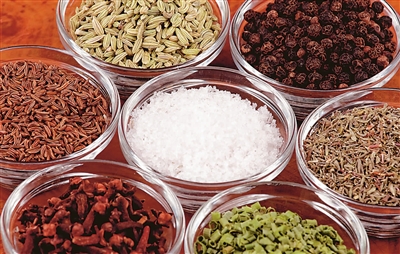Discover 5 food flavors for your health
 |
In addition a texture, color or nature,each food has a food
Conventionally,there are 5 flavors of food: acid (or sour), bitter, |
Each flavor from the Chinese
multimillennial experience has aparticular tropism for a function:
– The acid flavor has an affinity with the liver function.
– The bitter flavor with heart function.
– The sweet flavor with the Rate function.
– The pungent flavor with lung function.
– The salty flavor with Kidney function.
Even if a food has many flavors, there are more pronounced than others, so it
can be placed in one category or another.
This direct practical interest in the way of eating. As follows:
– This taste will feed a particular function (eg, sweetness
will nourish the Spleen function)
– Abuse of such taste will injure the corresponding function
(eg, abuse of bitter taste will promote hair loss, via the lung function)
– It is therefore appropriate, at meals, consume a small amount of
all these flavors.
– In case of weakness of a particular function, the body
unconsciously be attracted by the corresponding taste. Similarly, in this case,
it is appropriate to emphasize this flavor.
– In case of hyperfunction of a particular function, the body
unconsciously have a repulsion for the same taste.
|
Food flavor acid Chinese tradition smart health connected with the acid taste
|
 |
These foods by their astringent action,
have a constriction action and retention. Therefore, they can help in the
treatment of diseases in which one can note leaks or pathological flow
(transpiration, stool, urine, various bleeding).
This type of food also has a regenerative action of body fluids (especially the
stomach), restoring appetite and promote good digestion.
Regular consumption of foods with this flavor will be beneficial for liver
function. More specifically, while toning the lung function and activity
through its “gathering”, it prevents the liver function disperses
energy too.
On the contrary, in case of excess consumption of this flavor is the Rate that
is injured (in fact, these foods will retract the flesh, muscles wither,
chapped lips, etc..) Function. Its use should be restricted in cases of
infringement of tendons and ligaments.
Similarly, an inordinate fondness for this
flavor, and a total rejection, often indicate an imbalance in the Liver
function.
Some foods acidic flavor:
– Cereals and seeds: sourdough bread, pistachio seeds, sesame seeds
– Vegetables: sorrel, leeks, tomato
– Fruits: plum, grapefruit, gooseberry, lemon, strawberry, rhubarb, apricot,
pineapple, blackcurrant, peach, pear
– Animal products: sheep, lamb, pheasant, chicken, cheese, yoghurt
– Condiments, Spices: vinegar, lemon balm, nettle
– Beverages: Tea Tuo Cha, wine, cider
More exotic products:
Sorghum (seeds of African origin), yam (starchy
tubers), purslane, pomegranate, papaya, strawberry tree, lotus seeds, persimmon
(fig Japanese), litchi
Food flavor bitter
This food flavor is attached to the Heart function. In other words, bitter
foods have a special affinity for this function.
These foods, their drying action, hardening, steadying, consolidating and
dispersant have an evacuation and drying up moisture action. Therefore, they
can help in the treatment of diseases in which one can note edema or diarrhea.
This type of food also has an action calming nervousness and palpitations. The
bitter taste also stimulates appetite, increases the secretion of gastric
juices and can have a emetic action on toxins.
Regular consumption of bitter foods will be beneficial for the Heart function.
On the contrary, in case of excess consumption of this flavor, one can note:
drying of the skin and mucous membranes, hair loss and hair, vomiting.
Similarly, an inordinate fondness for this flavor, and a total rejection, often
indicate an imbalance in the Heart function.
Some foods taste bitter:
– Cereals and grains: wheat, spelled
– Vegetables: asparagus, lettuce, seaweed, artichoke, celery, chicory, endive
– Fruits: apple, apricot, fig, grapefruit
– Animal products: pork, all fish
– Condiments and spices: basil, cardamom, tarragon, turmeric
– Oils: linseed, sesame
– Beverages: coffee, tea, absinthe, beer, gentian
More exotic products:
Balsam pear seeds, longan, rambutan (tropical
fruit Asian) Japanese),litchi

Food flavor sweet
Chinese tradition
smart health connected with the sweet taste another flavor: sweet.
This flavor is widely represented in our daily diet, although it
may be “colored” by many condiments and seasonings.
A flavor that is attached Spleen function. In other words, the sugar has a specific
affinity for this function.
These foods, their toning,
moisturizing, relaxing and harmonizing, restore vital energy and distributed in
different organs.
This type of food also has a calming effect in the joint or
rheumatic diseases moisture.
Regular consumption of foods with this flavor will be
beneficial for the Rate function.
Instead, the excess consumption of this flavor goes directly
injure the Spleen function. Indeed, the latter do not like excess moisture,
while the sweetness, slowing the functions of the stomach, promotes the
production of moisture in the digestive tract and slows the flow of energy,
causing eg fatigue.
Similarly, an inordinate fondness for this flavor, and a
total rejection, often indicate an imbalance in the Spleen function.
Some foods taste sweet:
– Cereals and grains: spelled, corn, millet, quinoa, glutinous rice, rye,
almonds, peanuts, walnuts, lotus seed
– Vegetables: beans, peas, black soybeans, asparagus, eggplant, beets, pumpkin,
peas, carrots, cabbage, broccoli
– Fruits: dates, banana, grape, pear, blackberry, coconut, avocado, cherry,
apple, fig
– Animal products: eel, carp, mullet, scallops, Jacques
– Oils: palm, sesame, grape, olive, walnut,
soybean, peanut
– Condiments, Spices: barley sugar, malt sugar, maple syrup
– Drinks: fruit juices, soy milk
More exotic products:
Amarante (leaf or seed), kamut (ancient variety of durum wheat)
Food flavor pungent
Chinese tradition smart health connected with the pungent another flavor: pungent.
A flavor that is linked to lung function. In other words, pungent foods have a
special affinity for this function.
These foods by their dispersing action and sudorific, circulate the energy of
the body, body fluids and blood.
Regular consumption of foods with this flavor will be beneficial for lung
function, optimizing the immune system and restoring the metabolism. Causing
sweating, these foods can chase the wind and cold of the body (cough,
bronchitis, etc.).
On the contrary, in case of excess consumption of this flavor is the lung
function that is damaged, resulting in a contraction of tendons and dry nails
(this excess harms the liver function). These foods are not recommended in case
of lack of energy, exhaustion of body fluids or sweating.
Similarly, an inordinate fondness for this flavor, and a total rejection, often
indicate an imbalance in the lung function.
Some food flavor piquant:
– Cereals and grains: millet, barley, oats
– Vegetables: leek, radish, garlic, ginger, onion, black soybeans, bulb onions,
fennel, turnip, mustard seed
– Fruit: peach, dried apricots
– Animal products: chicken, honey, pollen, horse meat
– Oil soybean, flax
– Condiments and spices: pepper, mint, coriander, oregano, sage, thyme, chives
– Drinks: jasmine tea, alcohol
Food flavor salty
This food flavor is attached to the Kidney function. In other words,
the salt has a specific affinity for this function.
These foods, their Softener action drowsy, moisturizing and laxative, used to
reconstruct the Kidney function and refresh the blood. They also have the ability
to disperse accumulations, to moisten and soften the hardened masses.
Regular consumption of foods with this flavor will be beneficial for kidney
function, giving it energy.
On the contrary, in case of excess consumption of this flavor, the blood
becomes stagnant in the vessels, by altering its viscosity. Similarly, avoid
overuse of this flavor for infringement of the blood (high blood pressure for
example).
Similarly, an inordinate fondness for this flavor, and a total rejection, often
indicate an imbalance in the kidney function.
Some foods taste salty:
– Cereals and grains: millet, oats, barley, rye, alfalfa sprouts and barley
– Vegetables: seaweed, black fungus, soybeans, asparagus, dandelion
– Fruits: Chestnut
– Animal products: sausage, duck, pigeon, pork,
cured wild boar, shrimp, oyster, mussel, squid, cheese, fish eggs
– Condiments and spices: salt, soy sauce
– Drinks: Perrier, Badoit, Vichy, borage
More exotic products:Natto (traditional Japanese food made from fermented
soybe)
Before enjoying the
friendliness during the common meal with those present, the Chinese usually
have a compassionate thought for others. (Click here to know more about food flavor)
Read also
The philosophy of Chinese food for your natural health
The nature of Chinese food
Go to health home page
Improve your health with traditional natural treatment -B Smart Method of AB Smart Health









